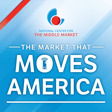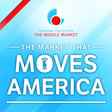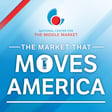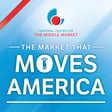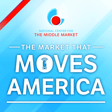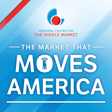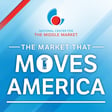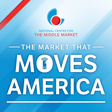Become a Creator today!Start creating today - Share your story with the world!
Start for free
00:00:00
00:00:01

Innovative technology in the commercial payments sector
As the world becomes increasingly digitized, businesses are looking for ways to streamline their operations and improve customer experience. In this episode, we sit down with Max Eliscu, Founder of Viewpost, and discuss the benefits of moving away from physical checks to adopting electronic payment methods. Max shares his insights on the future of commercial payments and how middle market businesses can stay ahead of the curve.
Viewpost streamlines payments for companies and provides a free online portal for vendors to view payment history and remittance information.
Transcript
Introduction to 'The Market That Moves America'
00:00:08
Speaker
Welcome to The Market That Moves America, a podcast from the National Center for the Middle Market. The center is the leading source of knowledge, leadership and innovative research on the middle market economy. Throughout our podcast, we will feature middle market leaders and stakeholders to hear their real world perspectives on trends and emerging issues.
Digitization in Commercial Payments
00:00:28
Speaker
Today's episode of The Market That Moves America is about digitization and technology in the commercial payment space, how companies can move away from writing physical checks and check writing to a more electronic means as a way of increasing accuracy, efficiency, and customer experience.
Guest Introduction: Max Elisku
00:00:46
Speaker
Our guest today is Max Elisku, who's the founder and CEO of ViewPost. Max, I want to welcome you to our podcast. Thank you. I'm really pleased to be here. So let's just start by learning a little bit more about you. Just to tell us a bit about your background. You founded a few companies. I know going back to your first business, which was LSU founded in 1996.
00:01:08
Speaker
And then, of course, ViewPost. So if you could tell us a little bit about that, your personal background, and then just your experience being an entrepreneur.
Max Elisku's Career Journey
00:01:16
Speaker
Sure. I began my career as a middle market banker working for Bank of America, what was then Nations Bank. I selected them because they were really the most maverick, almost rule breakery of financial institutions. So I thought they would be the most fun bank to work for.
00:01:31
Speaker
In 1996, I saw banks moving to credit scoring as a more efficient vehicle to deliver credit, both term loans and working capital to small business customers. And it was clear to me then, even though I was only 25, that that was going to create a big credit gap in the marketplace. And the companies that I thought would take advantage of that gap to deliver credit to small business owners were not companies that I would have, as a banker, wanted to refer my clients to.
00:01:59
Speaker
Another way of thinking about that is if I don't want to refer my clients because of their level of service quality, it becomes easy to compete on service quality. So I wrote a business plan. I raised $2.3 million in equity at the time in Orlando, Florida, where there is no venture capital. So that was a
Challenges with Check Payments
00:02:17
Speaker
challenge. And I started LSU to simplify access to working capital for small and middle market companies.
00:02:23
Speaker
Over the decades, we had a supply chain finance, which generally targets very big companies who want to give their vendors the ability to dynamically control when they're paid on their open invoices. And along the way, the biggest friction point that we experienced at LSU always related to payments. Checks then and now still dominate corporate payments. And when corporates pay the ACA, they generally are not able to deliver remittance information with their payments. So sometimes
00:02:50
Speaker
literally tens of millions of dollars will just show up in our bank account and we will have no idea what it's for, who it's for, and what invoices it's paying. We have to wait for an email or sometimes literally a letter in USPS to arrive to tell us that we've been paid and on what we've been paid. It's literally unbelievable.
00:03:11
Speaker
So as we grew as a business and we now process tens of billions of dollars a year in invoices at LSU, payment became our greatest friction point. And in 2011, I started ViewPost to address that payment inefficiency because I understood that we were just a microcosm. It wasn't just something we were experiencing. It was something that every business in the US experiences.
00:03:32
Speaker
So for me, being an entrepreneur has been great. It's definitely not for everyone. It is hard work. It requires high risk tolerance and incredible levels of resiliency. But for those with the Constitution to be okay with those things, it's just so rewarding.
00:03:48
Speaker
creation is fun for me. Getting up every day and solving problems all day long is fun for me, not exhausting for me. Making a difference for our employees and for the businesses that we support is fun for me. So in my case, the fun just grossly outweighs the pain and it's just been an absolute pleasure over the last 27 years.
00:04:09
Speaker
Yeah. What a great story. I mean, that's kind of a common thread that I hear quite a bit is about finding that problem and having the passion to continually keep solving it and adding value to your customers and your clients.
00:04:25
Speaker
So, as a fintech company, talking specifically now about viewposts, here at the center, we've been talking about digital transformation for mid-sized companies for the US middle market, yep, for almost four years now.
Importance of Rethinking Payment Systems
00:04:39
Speaker
It even predates the pandemic. In your mind, why is it critical for mid-sized businesses to think about their payment systems? Because again, the tradition has just been to write physical checks, right?
00:04:52
Speaker
What are some of the benefits you think they get from moving on to a platform like yours? Sure. Well, I mean, there are many ways to tackle that. I will go down one of those. I think most middle market companies will already be doing something to eliminate checks.
00:05:07
Speaker
They'll be sending some ACH payments through their bank. They overwhelmingly will have a purchasing card either from their bank or American Express, or in some way they'll be trying to move card to spend, and they'll have, in many cases, virtual card relationships with the bank or a FinTech.
00:05:24
Speaker
despite all of that, checks persist. I think in nearly every single business, no matter their size. So if you happen to be a middle market company that isn't doing any of those things, you are using ACH purchasing cards or virtual cards, it's definitely time to start. The advantages
00:05:43
Speaker
are going to be greater control over payment speed, improved payment security, reduced risk of fraud and new savings that are just waiting for you to capture. They're sitting there untouched and all you have to do is ask and they become real and material.
00:06:01
Speaker
In many cases, almost everyone who's listening to this podcast, who's a business owner, will have both a corporate and a personal credit card, and they probably choose which Visa product or MX product they're using based on the rewards or the rebates that they're getting.
00:06:17
Speaker
So they spend on card because of savings or because of fraud prevention. Those same tools are available to businesses. And if you're not using them, then you're just leaving the rebate and you're leaving the savings and you're leaving the security controls on the table. They're just waiting for you to use them. So if you're not doing that, it's time to start.
00:06:36
Speaker
you can talk to any of your banks. They all will offer some form of these types of solutions or the dozens or perhaps hundreds of fintechs in the market, including viewposts that can help with those types of things. If you are like the majority of businesses who are already using some combination of virtual card, purchasing cards, ACH, you've invested in some degree to get rid of the check and you're best in class at doing those things,
00:07:03
Speaker
you still probably have 40% of your payments being sent out the door via paper check. So the big question is, what can be done about that 40% or 60% or 70% as the case may be?
ViewPost Solutions for Electronic Payments
00:07:16
Speaker
That's really the market that ViewPost directly targets. We make it possible to outsource the printing of the remaining checks, 98% of businesses print their own checks, even when they are enormous.
00:07:30
Speaker
and we apply optimization technology to the remainder of those checks, which is to say we work to enroll vendors in electronic payments from the checks and we do that without creating any operational friction for our customers. It's built into the printing process so our customers can
00:07:49
Speaker
tackle easily the last mile, the remaining checks without having to deactivate or change any of their banking relationships or their product relationships that exist today. Those checks are the payments that have been missed.
00:08:05
Speaker
our clients are able to outsource the printing of those payments. And we use the payment as the digital roadmap, as the roadmap to know exactly who we next need to electronify. And we do that in real time without changing the printing SLAs. So it's really a wonderful product that only creates net new value for clients. And it's available uniquely to everyone because we're not trying to convince them to break up with their existing providers.
00:08:31
Speaker
we're just giving them a solution to address what's left. That's a much easier decision point than breaking up with someone. Yeah, sure. So in your view, why is that percentage or that gap that you're going after, why is it so large? Do you think some of these companies are just, they just don't understand it or they haven't gone there yet or they're just unaware of these different opportunities that exist? So for example, when you sit down with a
00:08:56
Speaker
I assume you're talking either CFOs or treasures or depending on the size of the company, maybe even the owner. How do those conversations unfold where you aren't encouraging them to break up with a bank, but you want them to get to see, hey, this is going to provide you a lot of additional benefit, even though you're already on some of those electronic payment platforms that you described earlier.
00:09:17
Speaker
Yeah, so two part question. First was, why are so many payments still paper, even though almost everyone has some form of campaign or process or technology to get rid of the check? So let's tackle that one and then move to the second part of the question. So the reason that there's still so many checks that the check persists is because
00:09:40
Speaker
The best in-class products that are available today from banks and fintechs require campaign-based inefficient and painful processes for business owners. So the typical approach will be a bank or a fintech will ask a business owner to export from their accounting system their vendor master, everyone they've ever done business with. So they'll give that report
00:10:03
Speaker
to the bank or the fintech who will then sort it from biggest to smallest, give it to a team of people who for six to eight weeks will do their best to call everyone on that list to determine whether they would prefer to not receive a check. What they're actually doing though is calling a huge number of companies that aren't even owed money because the vendor master is everyone you've ever done business with because you never know in the future when you might do business for those people.
00:10:25
Speaker
80 plus percent of the time they're not able to disposition a preference from those companies because they're not calling them really at the right time. And all of those phone calls to people, business owners, vendors who are not owed money frustrates the vendors. It wastes their time and they start calling the payer saying, why are you having your bank call me? You don't even owe me any money and I'm taking phone calls.
00:10:46
Speaker
from your bank and it's irritating. At the end of that campaign, the bank or the FinTech will give that list, and it's oftentimes literally an Excel spreadsheet, to the payer who has to upload it into their accounting system to change the default payment status for that payer, so the manual process generally, so that the next time they pay that vendor, if they ever pay that vendor again, they can extract that payment data at that time from their accounting system
00:11:13
Speaker
instead of writing a check and send it to their bank or their FinTech, who then will create a virtual card and send it on to the vendor. And if for whatever reason the vendor doesn't accept that card, that card will then have to be voided. You have to undo the transaction and a paper check needs to be printed and mailed to the vendor anyway.
00:11:32
Speaker
So that process is painful for the payers. Frankly, it's painful for the banks and the fendex. And it misses a huge amount of opportunity because they get in touch with so few vendors during that six to eight week period. And even some of the ones they get in touch with, they can't deliver payment to because the vendor will say, well, you can only pay me with a virtual card.
00:11:51
Speaker
If you log into my phone system and do it and oftentimes banks don't do that or store your customer's credentials and log into my portal and make the payment manually or only up to a certain dollar value. So you have a problem with you don't get in touch with every vendor and their conditions that prevent electronification of those vendor payments.
00:12:09
Speaker
and you have so much buyer involvement that the buyers generally will say, I can only tolerate this for my payables to run at once a year, or even less than that. So what you're really experiencing in the typical program to get rid of the check is a six to eight week window where you get to try. And then to save brain damage for the customer, you only get to try once every 12 or 18 months. And that's
Overcoming Challenges in Payment Transition
00:12:35
Speaker
a little bit like being in California during the gold rush,
00:12:38
Speaker
and having like gold filtering technology that you're only allowed to put into the river for six weeks and then after that you have to take it out of the river and every piece of gold that remains just keeps washed down the river and we think of that as the checks. So what's different for us
00:12:55
Speaker
is that we use the checks as the tool to get in touch with the vendors in the moment that the vendor is most likely to not want to receive a paper check. And we're able to, in that moment, transform the check into the form of payment that the vendor wants in that moment. And we can do all of that without any buyer involvement whatsoever. No business process change, no reconciliation changes, no accounting control changes. It is a back end hidden utility sitting inside of the printing process.
00:13:24
Speaker
So we use a perfect gold map every time and we eliminate buyer involvement, which then allows us to convert payments every single time we see a payment. So every check is a digital roadmap to getting rid of the check. And so we simplify the process and our results are, as a consequence, much, much, much better.
00:13:43
Speaker
That's why that problem persists of check and how we uniquely tackle it. Critical to adoption for us is making it possible that everyone is a candidate. Everyone is legitimately able to use the service if they're of a certain size. If you're a banker, you're a fintech, and you're calling on a customer,
00:14:03
Speaker
And you find out when you call on them that they already have this solution with another bank or they've already begun their electronification journey, the sale is over and your ability to deliver value to that customer is over because they never want to rip out what they've already spent time installing to adopt the net new solution. You have to sort of wait for them to be really angry with their existing provider for it to be an opportunity.
00:14:26
Speaker
Whereas in our case, we just focus on everything the existing provider has missed. Keep your existing bank, keep your existing FinTech. If a check exists, that's clearly something that was a missed opportunity. It's slower, it's higher risk. There's clearly no savings there. Install our filtering system into that check flow and we will systematically work to get rid of what's left.
00:14:49
Speaker
That's, I think, why we drive so much adoption when people become aware of our solution. That answers the questions. Yeah, it does.
Future Trends in B2B Payments
00:14:56
Speaker
That was a great explanation. As you think ahead to the future, I mean, you've done a lot of innovation in this space. What are some things that you think might be coming down the road in terms of B2B payments? You know, from a consumer standpoint, I could think back to Venmo when that was launched completely changed, right, from my ability to pay my friends, family members, whoever.
00:15:18
Speaker
Are there things like that that are going to revolutionize B2B or do you think they're going to be more incremental changes that continue to happen over time? It's a great question. I don't think that there's a tidal wave coming. There are new capabilities that are coming that
00:15:35
Speaker
The difference between consumer adoption and commercial adoption are checks and balances and controls that exist inside of businesses and should exist inside of businesses. We are dealing with a lot of money, financial transactions, credit transactions, and every employee of a company doesn't have the ability and shouldn't have the ability to just dynamically choose to do something new and innovative and easy.
00:16:00
Speaker
the way that we can as consumers. There's very little consequences in individual adopting Square or Venmo or experimenting with any of these automation solutions and so forth. But as a business, you have to have checks and balances, and those checks and balances slow down the progress.
00:16:16
Speaker
However, we are seeing payments become a critical embedded capability inside of nearly every form of business to business automation tool. And so over time, we are going to see electronic payments become ubiquitous as a result. If every accounting system and every procure to pay system is embedding sort of the dominant players into their processes,
00:16:44
Speaker
so that paying electronically just becomes something you don't even have to think about, then we're going to see a rapidly accelerating reduction of paper checks. And frankly, that's what's driving a lot of our growth. We are being embedded in more and more solutions and customer adoption as a result is not something that we are seeking out. It's just occurring because it's part of the process of the solutions that businesses are already using. Interesting.
Digital Transformation Advice
00:17:12
Speaker
So if we were to step back a little bit more broadly, one of the things that our center talks about quite a bit is, you know, unlike enterprise organizations, for example, middle-market companies tend to have resource constraints, whether it be capital, people, time. I mean,
00:17:28
Speaker
cups into a lot of this is right. But uniquely in the middle market where you scale, but you have to manage probably with a lot less. And so when we talk about digital transformation or making technology investments, a lot of times the questions we get are, where do I start? Yeah. How can I go about that journey? And so what would be your point of view on, you know, what do you start small? Do you just test things and then build incrementally or
00:17:57
Speaker
Do you think it's better to kind of pick a big major investment, kind of go in on and really drive dramatic change, whether it's, again, payments, operating, you know, customer relationship management systems or marketing or sales, share our list of the area. I mean, what would your thoughts be on that?
00:18:17
Speaker
Yeah, so it's such an important question. And in a way, it sort of highlights exactly what I've been saying relative to complexity and embedded solutions and the challenges of ripping them out. I think the premise is whether business owners should dabble or dive in.
00:18:32
Speaker
And that's because diving in locks them into solutions, and it absolutely does. I think it's a very scary proposition and generally not a good idea for a business owner to decide, I'm just going to jump.
00:18:49
Speaker
You won't at that point know with a high degree of certainty that the solution that you're jumping into is in fact the right solution for your business. So I think that the technology journey on a more broad basis, it should be measured against ROI and return on investment.
00:19:08
Speaker
needs to consider the ongoing and the future switching costs of those solutions. So for most companies, the highest ROI isn't going to come from automating back office solutions. It's going to come from investing in business process change that directly targets delivering service exceptionality for their business and their customers.
00:19:28
Speaker
way, way down on a list of most important things will be back office processes. In fact, the most important, the most precious resource for management time or better said, the most precious resource for all businesses is their management time. And administrative efficiency isn't always, in fact, it's rarely going to be the highest and best use of that time. So I would recommend the businesses focus on how they deliver
00:19:51
Speaker
service exceptionality and what technology they can deploy that will improve that exceptionality. And I would further recommend that they take small incremental steps to ensure that the thing that they're doing is working. It is in fact improving their outcomes, improving their ROI, improving their customer experience,
00:20:15
Speaker
And then once they're absolutely sure they've made the right decision, they're going in the right direction, they can then make a decision to invest big when they have certainty that they're investing in the right area. If you did that and you invested in Betamax, that would have been a bad thing.
00:20:32
Speaker
That's the reason that ViewPost is designed to target the check. It's very easy for a business owner to say, well, yeah, 40% or 50% or 60% of my payments are checks, and if I can get rid of printing them without having to undo all of the investments I've made so far in payment automation.
00:20:52
Speaker
and you're going to further electronify it, I only have upside. If I can deploy this capability easily at very low cost, I can get out of the handling of literally paper and stuffing of envelopes and buying check stock and stamps.
00:21:08
Speaker
And you are incrementally going to reduce in a very targeted way that my team doesn't have to be involved in the mailing of those checks. And I can earn rebates that cover my cost of no longer printing my checks by a factor of 30 or 40, 50, 60 times a year forever. That's a real easy decision for me to make.
00:21:28
Speaker
If you want to convince me to leave JP Morgan and switch to Bank of America, that's a lot of brain damage for me. And now I have to undo so many things, that's way harder decision to make. Right, right.
00:21:42
Speaker
Yeah, I think this concept of piloting and testing and test driving, I think is the right one. We're seeing some service providers that traditionally have been providing these massive platforms, ERP systems, cloud, a variety of things, right? They're starting to realize that those things need to be scaled down, one for affordability, but also Stumpies may not need all those bells and whistles, particularly to get started, right?
00:22:11
Speaker
Give me something small and usable to your point. Show me the value of that. And then we can start to build it going forward. So that's that's really great insight.
Building Successful Partnerships
00:22:21
Speaker
You've mentioned partnerships a couple of times. I mean, tell me what's essential to building really good partnerships and maybe what are some of the things that you would say to avoid or maybe pitfalls in that. Yeah.
00:22:33
Speaker
Happy to address that. I think the most valuable lesson that we have learned, and in retrospect seems incredibly obvious, is that no matter how game-changing a product may be, unless you find alignment with the partner's primary strategy and objective explicitly,
00:22:52
Speaker
success will forever remain out of touch and reach for that relationship. So let me give you a real example. We once entered into a partnership with one of the largest companies in the United States. The partner had determined that they had a product gap and that our capabilities uniquely met that gap. And so they entered into a partnership with us because their customers told them they had a product gap and they wanted it filled.
00:23:16
Speaker
We were ecstatic and also naive about the potential of that partnership. This company had five million small business customers and they committed to marketing our product to all of their users.
00:23:32
Speaker
And we agreed that to drive the greatest level of adoption, their customers should be able to enroll in our platform with one click from within their platform, single sign-on, and that we should make the product free to their users because the customer would cover the cost. So on the surface, it really sounded like a no-brainer and a game changer for our business.
00:23:55
Speaker
What we ultimately learned was that the partner needed to fill a gap to remain competitive in the marketplace. But filling that gap was more marketing than anything else. Driving utilization, which created upfront costs for the partner, simply didn't align with their measurable goals.
00:24:11
Speaker
As a result, the partnership failed to realize its potential. So learning from that experience, we are now very, very careful to understand our partners' critical strategic and financial objectives and to ensure that our partnerships directly aligns with how they are measured, which creates alignment and accountability, and alignment and accountability are essential to partnership success.
00:24:34
Speaker
Had we asked that partner that I was referring to, why do you want this product? Why do you want this partnership? Well, we have a product gap. Okay, great. But how is your success as a business measured? Is it measured by whether your customers tell you you fill the product gap, or is it measured by the revenue that you generate from product sales or customer satisfaction? If we had asked the right questions about why they really wanted it,
00:25:02
Speaker
and identified is what they were asking us to do, how their people were paid, is the success of our partnership aligned with how they're rewarded as a business and how their people were rewarded. We would have discovered that there was a misalignment, that this was a lot of work, but what was in their best interest from an economic perspective had nothing to do with our partnership. They just wanted to
00:25:27
Speaker
not have their customers complain that there was a product app within their feature set that we filled, but it was a lot of work for not a lot of accountability as a result. Wow, that's really interesting. I'm going to close with just kind of one last question for you, and that's
Navigating Economic Uncertainties
00:25:43
Speaker
There's a lot of uncertainty out there today, whether you think about inflation and rising interest rates, and there's challenges around the workforce, including finding people to hire and continue to grow a business. As a business owner, what advice would you give to middle market leaders who are trying to navigate all of this uncertainty out there right now? What are some of the things they should be thinking about and or doing?
00:26:09
Speaker
Yeah, so it really is a difficult market for many companies and many industries. Everyone from bankers to accountants to partners and vendors, sources of capital are distracted by the chaos that exists at this moment and has existed for frankly a number of years.
00:26:26
Speaker
Though in that chaos, change and opportunity are often born. So for the business owner today, particularly the middle market company who has perhaps fewer resources and less certain access to capital than much larger companies, there is likely nothing more important than ensuring their future viability. And that means the companies need to take a close look.
00:26:49
Speaker
a brutally honest look at what is working in their companies and what is not, and make the difficult decisions that are often delayed or overlooked in boom times. Are they profitable? If so, how efficient, how profitable are they? How are their margins and what can be done to improve those margins? And if they aren't profitable, same question, what can be done to change that paradigm? Business owners need to think outside of the box.
00:27:14
Speaker
and make difficult decisions. And once they've ensured that they're not going to run out of oxygen, which I think in the context of vendor market companies is equivalent to money, it's often then critically important for them to focus on their sources of differentiation, their service excellence. What are you doing to truly delight your customers? Which ironically almost always requires you to actively choose to be bad in the interest of being great.
00:27:39
Speaker
And I think it probably comes in that order. Breathe so you can survive, then focus on service differentiation, which itself, again, requires difficult choices. It's not natural for business owners to not want to delight and meet every single one of their customers' needs. But trying to be good at everything is the fastest path to mediocrity, and there's nothing differentiating about mediocrity.
00:28:06
Speaker
Very, very true. Well, Max, I want to thank you for your time. This has been an awesome conversation. Appreciate your willingness to come on the podcast and share all these great insights with us. My absolute pleasure. I really enjoyed it.
Closing Remarks
00:28:20
Speaker
For more about Max or if any of our listeners would like to learn about ViewPost, I would invite you to visit their site at viewpost.com. Thank you. Thank you, Dr.
00:28:34
Speaker
Thank you for listening to The Market That Moves America. Never miss a new episode by subscribing anywhere podcasts can be found. You can also subscribe to our email newsletter at middlemarketcenter.org.
